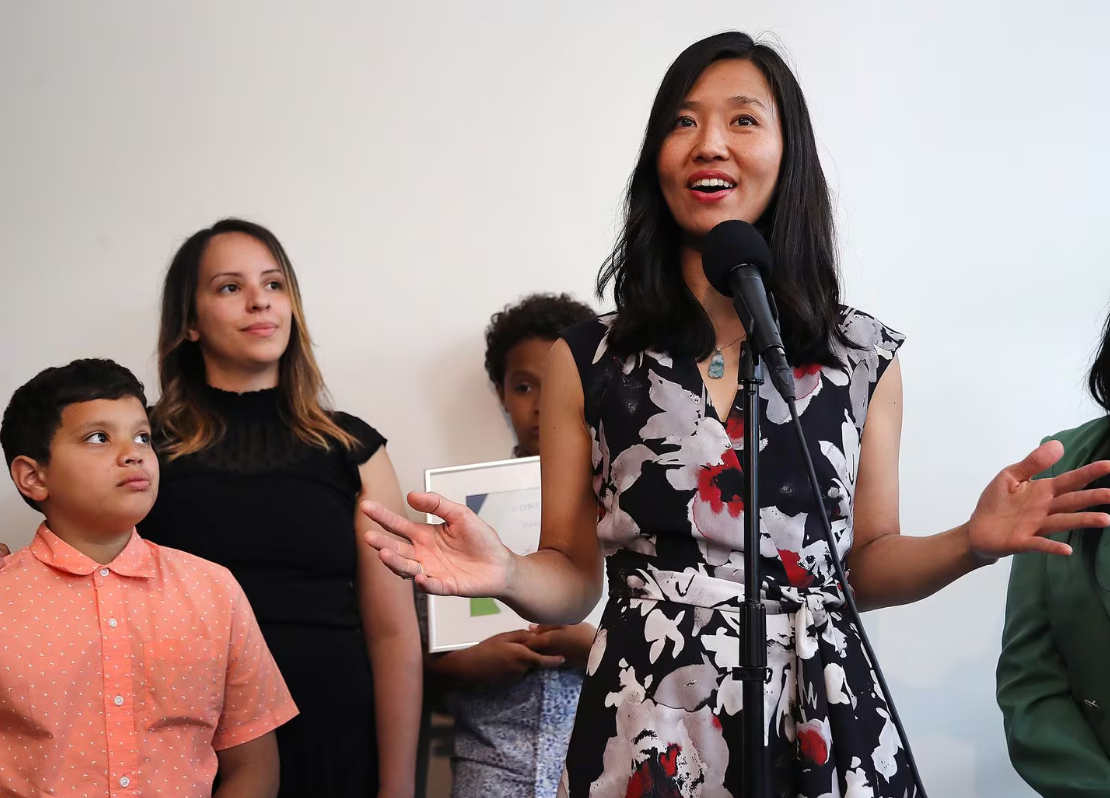吴弭市长获胜,波士顿市议会通过有争议的房产税提案

【中美创新时报2024 年 6 月6 日编译讯】(记者温友平编译)波士顿市议会周三(5日)以 8 票对 4 票通过了吴弭市长有争议的房产税提案,吴弭在首次宣布该政策推动两个多月后获得了胜利。《波士顿环球报》记者妮基·格里斯沃尔德(Niki Griswold )对此作了下述报道。
议员约翰·菲茨杰拉德(John FitzGerald)、爱德华·费连(Ed Flynn)、艾琳·墨菲(Erin Murphy )和布莱恩·沃雷尔(Brian Worrell )投票反对该措施,议员朱莉娅·梅希亚(Julia Mejia )投票赞成。
虽然这是必要的一步,但议会投票并不是辩论的结束;该提案需要州立法机构的批准,而从历史上看,州立法机构让波士顿和其他市政府的大多数所谓的自治请愿书悄然夭折。
吴弭的税收政策遭到了商界的强烈反对,该政策将赋予该市暂时将商业地产税率提高到州法律允许的水平以上的权力。吴弭认为,如果商业地产价值像一些预测者预期的那样暴跌,那么这项措施对于保护住宅业主和租户(他们可能会面临公寓楼业主转嫁的更高租金)免受明年房产税大幅增加的影响是必要的。吴弭承认,即使实施了这项措施,住宅物业税仍可能增加,但这将为房主创造“软着陆”。
在疫情和远程办公的转变之后,随着办公室空置率的上升,财政监管机构和商业团体对波士顿商业地产价值下降发出了警告。近几个月来,几栋商业建筑的售价仅为其购买价的一小部分。
物业税约占该市年度预算的四分之三,而且由于马萨诸塞州的社区在法律上被要求实现预算平衡,商业地产价值的大幅下降可能意味着住宅物业的税收相应增加以弥补差额。
波士顿已经使用分割税率来减轻房主的税收负担,并对商业地产征收比住宅高出约两倍半的税率,这是法律允许的最高税率。吴弭的提议将允许该市暂时提高商业房地产的税率上限。
吴弭表示,在理想情况下,商业地产价值保持稳定,她不需要部署该措施。该提案将使她可以选择在三年内提高商业地产税率。
如果她确实实施了这项政策,该政策将在五年内逐步取消,她说,如果商业地产价值继续下降,这将有助于缓解向更高住宅地产税的过渡。
“我预见到这项提案的主要受益者是拥有房产但现金不足的房产所有者,就像我们波士顿的许多老年人和小房产的租户一样,”市议员加布里埃拉“吉吉”科莱塔·萨帕塔 (Gabriela “Gigi” Coletta Zapata) 表示,她是市议会政府运营委员会主席,负责监督该提案的辩论,并敦促她的同事批准该措施。 “我们等待的时间越长,拖延的时间越长,州议会的同事在 7 月 31 日正式会议结束之前处理此事的时间就越少。”
议员莎朗·杜尔坎(Sharon Durkan)也热情地支持该提案,并阅读了她 1 月份收到的一封来自选民的电子邮件,该选民告诉她,他们最新的房产税账单比去年增加了 13% 以上,威胁到他们留在波士顿的能力。
“这是我们保护居民的工具箱中的一个工具,为我们的城市保留了选择权,为我们的身体保留了选择权。参与税收对话和决策是我们的工作,”杜尔坎说。“这非常重要 [通过]。…因为如果我们不这样做,我们将收到更多这样的电子邮件,我们将有更多的人无法负担在城市的生活,无法负担得起留在家中的费用。”
但房地产和开发团体发起了一场激烈的运动来反对这项政策,称这将进一步损害本已陷入困境的行业以及小企业,并加速市中心地区经济下滑的螺旋式下降。
大波士顿房地产委员会首席执行官格雷格·瓦西尔在议会投票后发表声明称:“商业地产长期以来一直是波士顿预算的主要来源,而且面临着生存挑战。增加商业地产税是极其错误的,也是财政上的短视,最终将被证明会带来经济问题。市和州领导人不应该提高商业地产税率,而应该专注于提高该地区的竞争力和吸引企业。我们敦促灯塔山的官员拒绝这项存在严重缺陷的政策,专注于不惩罚任何一个行业的改革。”
在投票反对该措施之前,费连表示他担心该提案的潜在后果。
“我担心这会加剧已经陷入困境的开发和房地产行业的当前问题,有可能导致城市恶性循环,城市服务的削减将使波士顿变得不那么受欢迎,甚至进一步压低房地产价值,”费连说。
菲茨杰拉德也投了反对票,他说他不相信议会中有人希望看到住宅物业税大幅增加,但他担心该提案会打消公司在波士顿开展业务或落户的积极性。他还表示,重要的是让居民知道该提案不一定能阻止他们的物业税增加。
“重要的是让居民知道这不是他们的解决方案,”菲茨杰拉德说。“这将减轻你在一年内承受的打击,这在四年内会减轻,这很重要。然而,这并不意味着这个问题会逐年消失,居民仍会面临增长。”
吴弭在给《波士顿环球报》的一份声明中对议会通过这项措施表示感谢。
“我们地区的住房危机是联邦经济面临的最大威胁,我们需要所有可能的解决方案来改变现状,”吴弭在声明中说。 “对于收入固定的老年人、有孩子的家庭、一线工人和我们所有的社区成员,我们必须有办法让社区成员留在家中,同时提供优质的城市服务来支持居民和企业。”
科莱塔·萨帕塔周三告诉议会,她将继续研究增加受该提案影响的小企业的免税额的方法。
题图:吴弭市长的提案将允许波士顿市暂时增加该市对商业房地产征收的税额。.JOHN TLUMACKI/GLOBE STAFF
In a win for Mayor Wu, Boston City Council passes controversial property tax proposal
By Niki Griswold Globe Staff,Updated June 5, 2024
The Boston City Council approved by a vote of 8-4 Mayor Michelle Wu’s controversial property tax proposal on Wednesday, granting Wu a win more than two months after she first announced the policy push.
Councilors John FitzGerald, Ed Flynn, Erin Murphy, and Brian Worrell voted against the measure, with Councilor Julia Mejia voting present.
While a necessary step, the council vote is not the end of the debate; the proposal requires sign-off by the state Legislature, which historically has let most so-called home rule petitions from Boston and other municipalities quietly die.
Wu’s tax policy, which has faced vocal opposition from the business community, would give the city the power to temporarily increase the commercial property tax rate beyond what is allowed by state law. Wu argues the measure is necessary to shield residential property owners — and renters, who would likely face higher rents passed down by apartment building owners — from a steep increase in their property tax bills next year should commercial property values plunge, as some forecasters expect. Wu has admitted that residential property taxes will likely still increase, even with the measure in place, but it would create a “softer landing” for homeowners.
In the wake of the pandemic and the shift to remote work, fiscal watchdogs and business groups have raised the alarm about declining commercial property values in Boston as office vacancy rates climb. In recent months, several commercial buildings were sold for a fraction of their purchase price.
Property taxes fund about three-quarters of the city’s annual budget, and because Massachusetts communities are legally required to have a balanced budget, a significant decrease in commercial property values could mean a corresponding tax hike for residential properties to make up the difference.
Boston already uses a split tax rate to reduce the tax burden on homeowners and taxes commercial property at a rate about two-and-a-half times higher than residential, the maximum allowed by law. Wu’s proposal would allow the city to temporarily increase that ceiling on commercial real estate.
Wu has said in an ideal scenario, commercial property values remain stable and she would not need to deploy the measure. The proposal would give her the option to raise commercial property tax rates for three years.
If she does implement it, the policy would phase out over five years, which she said will help ease the transition to higher residential property taxes should commercial property values continue to decline.
“I foresee the main beneficiaries of this proposal are individuals who own property who are house rich but cash poor, like many of our seniors and tenants within small properties in Boston,” said Councilor Gabriela “Gigi” Coletta Zapata, who chairs the council’s government operations committee that oversaw the debate over the proposal, and urged her colleagues to approve the measure. “The longer we wait, the longer the delay, the less time there is for our colleagues at the Statehouse to take this up before their formal session ends on July 31.”
Councilor Sharon Durkan also passionately advocated for the proposal, and read an email she received from a constituent in January who told her their latest property tax bill increased more than 13 percent over the previous year, threatening their ability to stay in Boston.
“This is a tool in our toolbox to protect residents, preserving optionality for our city and preserving optionality for our body. To take part in tax conversations and decisions is our job,” Durkan said. “This is incredibly important [to pass]. … Because if we don’t, we are going to get a lot more emails like that and we’re gonna have a lot more people that cannot afford to live in the city, cannot afford to stay in their homes.”
But real estate and development groups have mounted a fierce campaign to fight the policy, saying it would further harm an already struggling industry as well as small businesses, and accelerate a downward economic spiral in the downtown area.
“Increasing taxes on commercial properties, an industry that has long fueled Boston’s budget, and an industry facing existential challenges, is incredibly misguided, fiscally short-sighted, and ultimately will be proven to be economically problematic,” said Greg Vasil, CEO of the Greater Boston Real Estate Board, in a statement following the council vote. “Instead of increasing the commercial property tax rate, city and state leaders must focus on boosting the region’s competitiveness and attracting businesses. We urge officials on Beacon Hill to reject this deeply flawed policy and focus on reforms that do not punish any one industry.”
Before voting against the measure, Flynn said he worried about the proposal’s potential consequences.
“I’m alarmed about [exacerbating] current issues in the already struggling development and real estate industry, with the potential to lead to an urban doom loop, with cuts to city services that would make Boston less desirable and even further drive down property values,” Flynn said.
FitzGerald, who also voted against the policy, said he doesn’t believe anyone on the council wants to see a dramatic increase in residential property taxes, but worries the proposal will disincentivize companies from doing business in or being located in Boston. He also said it’s important for residents to know the proposal will not necessarily prevent their property taxes from increasing.
“It’s important for residents to know that this isn’t a solution for them,” FitzGerald said. “This is going to soften the blow over four years of what you would take on in one year, which is important. However, that does not make the issue go away year over year for residents, the increase will still occur.”
In a statement to the Globe, Wu expressed gratitude to the council for passing the measure.
“Our regional housing crisis is the biggest threat to the Commonwealth’s economy, and we need every possible solution at hand to make a difference,” Wu said in the statement. “For seniors on fixed incomes, for families with children, for frontline workers and all our community members, we must have the tools to keep community members in their homes while delivering excellent city services to support residents and businesses.”
Coletta Zapata told the council Wednesday she will continue looking into ways to increase tax exemptions for small businesses who would be impacted by the proposal.

